Nation States: Power, Sovereignty, and Global Dynamics
The State and Globalisation
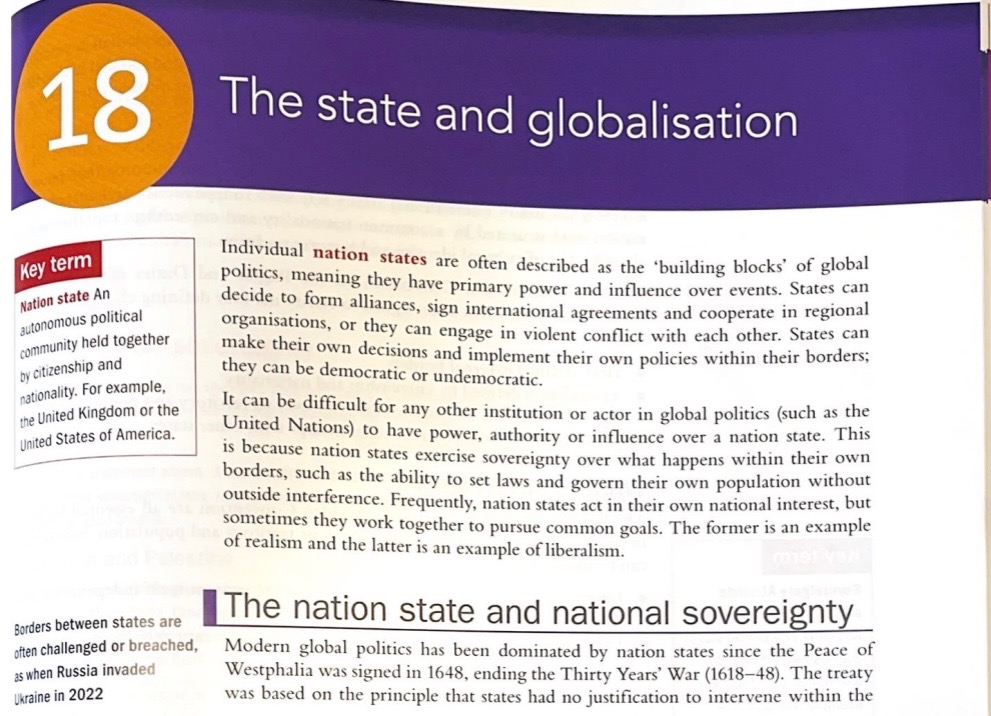
Key Term: Nation State
- Definition: An autonomous political community held together by citizenship and nationality.
- Examples: The United Kingdom, The United States of America.
- Thoughts: Nation states are fundamental in understanding global governance as they represent the primary units of political authority and influence in international relations.
Role of Nation States in Global Politics
- Building Blocks of Global Politics: Nation states play a crucial role by holding significant power and influence.
- Actions: States can form alliances, engage in international agreements, cooperate in regional organizations, or enter into conflicts.
- Decisions: They maintain the ability to implement their own policies within their borders, which can lead to democratic or undemocratic governance.
Sovereignty and Authority
- Sovereignty: The exclusive right of a nation state to exercise political authority without outside interference.
- Challenge: Other actors (e.g., international organizations like the UN) often cannot exert influence or authority over a nation state due to its sovereign nature.
- Example: Nation states can set laws and govern populations without external input, highlighting their autonomy.
National Interest vs. Common Goals
- National Interest: Nations tend to act primarily in their own national interests when making political decisions.
- Collaboration: Sometimes, nation states work together to pursue common goals.
- Theories: This dynamic illustrates realism, where states prioritize their own interests, versus liberalism, which emphasizes cooperation for mutual benefits.
Historical Context
- Modern Global Politics: Dominated by nation states since the Peace of Westphalia (1648).
- Impact of War: Historical treaties have established non-interference norms, as seen during conflicts like the Thirty Years' War (1618–48).
- Recent Example: The invasion of Ukraine in 2022 by Russia violates established norms regarding state sovereignty and borders.
Summary
Understanding the framework of nation states is key to analyzing global politics. Their sovereignty, interests, and interactions form the foundation of modern international relations. The balance between acting in national interest and pursuing collaborative goals influences global dynamics significantly.
Extended readings:
Notes on Nation States and Sovereignty
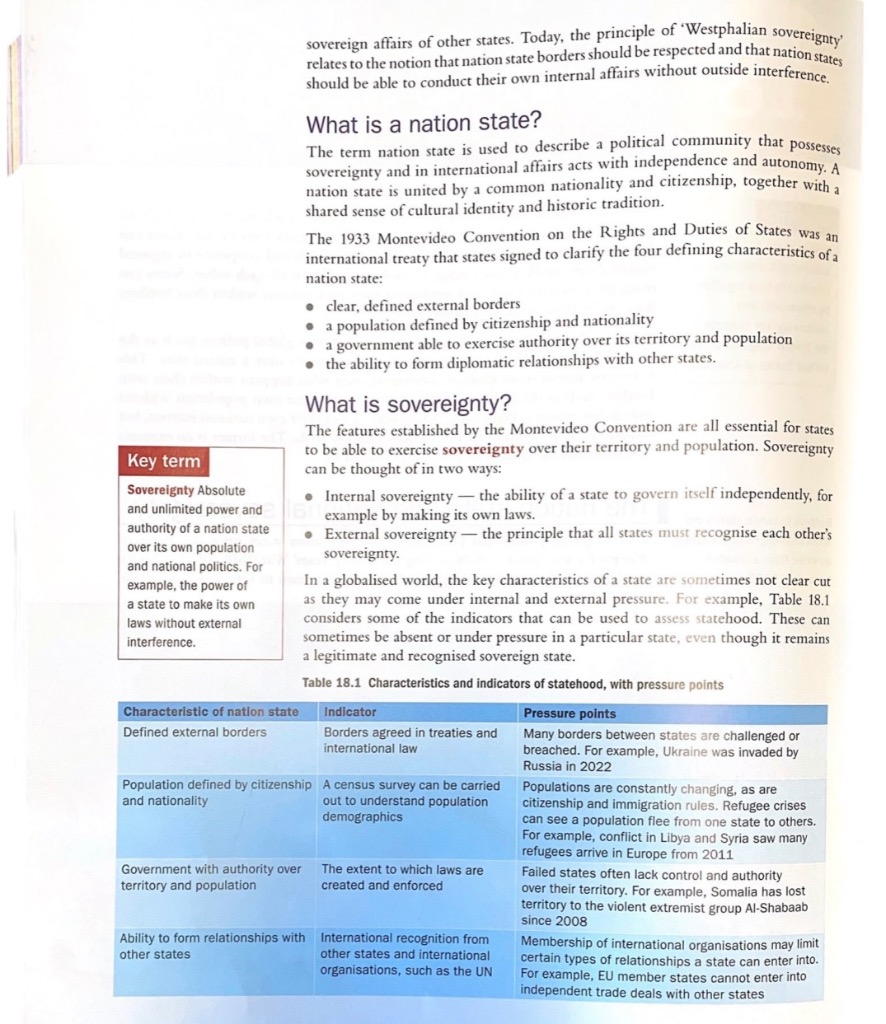
What is a Nation State?
- Definition: A nation state describes a political community with sovereignty and independence. It is characterized by a common identity and historical tradition.
- Thoughts: This concept is essential in understanding international relations and global politics, as it relates to how territories and populations interact.
Key Characteristics of a Nation State (According to the 1933 Montevideo Convention)
-
Clear, Defined External Borders:
- Borders should be recognized legally and protected.
- Thoughts: The idea of territorial integrity is crucial for maintaining peace and avoiding conflicts between states.
-
Population Defined by Citizenship and Nationality:
- A state must have a population that identifies with it through citizenship.
- Thoughts: This can influence national policies, representation, and social cohesion.
-
A Government Able to Exercise Authority Over Its Territory and Population:
- Governance must be effective and recognized.
- Thoughts: Strong governments are often seen as necessary for stability and development.
-
Ability to Form Diplomatic Relationships With Other States:
- Engaging in international relations and treaties.
- Thoughts: This is vital for trade, alliances, and conflict resolution.
What is Sovereignty?
- Definition: Sovereignty refers to the absolute authority of a nation state over its internal and external affairs.
- Thoughts: It is important to understand the dual aspects of sovereignty which can be influenced by international recognition.
Internal Sovereignty:
- Concept: The ability of a state to govern itself independently.
- Ideas: Effective governance is essential for addressing the needs and rights of citizens.
External Sovereignty:
- Concept: The principle that states recognize each other’s sovereignty.
- Ideas: This recognition can be fragile; violations can lead to conflicts or loss of status.
Characteristics and Indicators of Statehood with Pressure Points
| Characteristic of Nation State | Indicator | Pressure Points |
|---|---|---|
| Defined external borders | Borders agreed in treaties and international law | Many borders between states are challenged or breached (e.g., Ukraine & Russia 2022) |
| Population defined by citizenship and nationality | Census surveys to understand population demographics | Populations can be dynamic; can change due to migrations and crises |
| Government with authority over territory and population | Extent to which laws are created and enforced | Failed states may lose control over territory (e.g., Somalia & Al-Shabaab) |
| Ability to form relationships with other states | International recognition from other states and organizations | Membership limits in organizations may affect relationships (e.g., UN) |
- Thoughts: Understanding these characteristics and pressure points can help analyze the stability and legitimacy of states in the international system.
Extended readings:
Struggles for Sovereignty
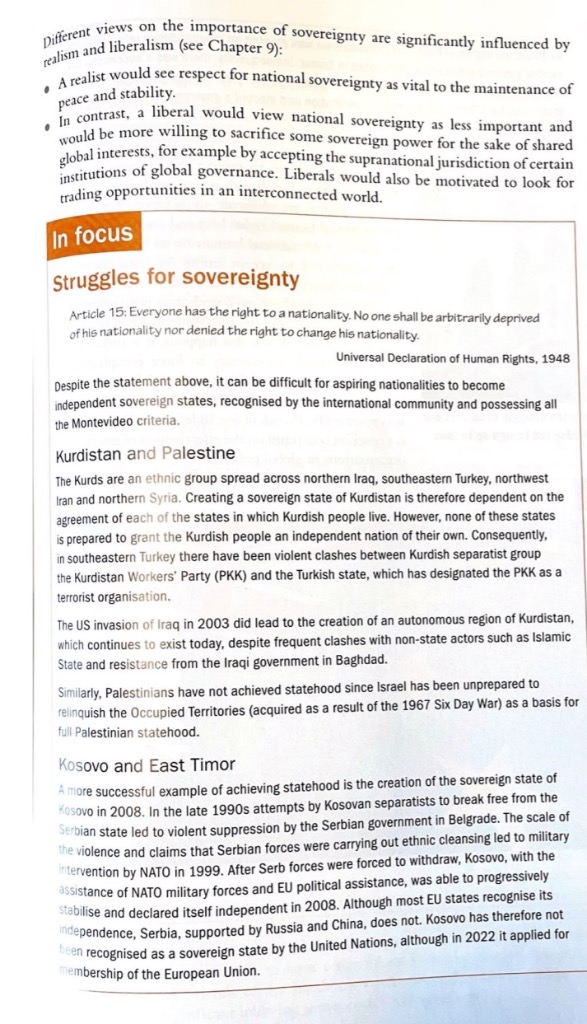
-
Importance of Sovereignty
- Different perspectives exist on national sovereignty:
- Realists view it as essential for maintaining peace and stability.
- Liberals consider it less important, often willing to compromise for global governance and trading opportunities.
- Thoughts: Understanding these perspectives is crucial in international relations and diplomacy, as they influence how countries interact on issues like trade agreements and conflict resolution.
- Different perspectives exist on national sovereignty:
-
Article 15 of the Universal Declaration of Human Rights
- Emphasizes the right to nationality.
- Challenges exist for nationalities seeking recognition and statehood according to the Montevideo criteria, which includes permanence, a defined territory, a population, and the capacity to enter into relations with other states.
- Thoughts: This highlights the ongoing struggles many groups face in gaining acceptance and legitimacy on the international stage.
-
Kurdistan and Palestine
- The Kurdish population is spread across several countries, including Iraq, Turkey, and Syria, but struggles for recognition and autonomy.
- The PKK (Kurdistan Workers' Party) is classified as a terrorist organization by Turkey, complicating Kurdish aspirations for statehood.
- Palestinians continue to seek statehood amidst Israeli occupation, with the 1967 borders as a central contention point.
- Thoughts: These cases illustrate the complexities of ethnic nationalism and territorial claims, often leading to prolonged conflict and humanitarian issues.
- The Kurdish population is spread across several countries, including Iraq, Turkey, and Syria, but struggles for recognition and autonomy.
-
Kosovo and East Timor
- Kosovo declared independence in 2008 after a prolonged conflict with Serbia, influenced by NATO intervention.
- East Timor's struggle for independence culminated in its official recognition in 2002.
- External recognition varies; Kosovo is supported by most EU nations but has not achieved full global recognition, notably from countries like Russia and China.
- Thoughts: The paths to statehood for these regions underscore the role of international dynamics and interventions in shaping national identities and sovereignty.
Summary
This excerpt discusses the complexities surrounding national sovereignty, highlighting struggles and successes in achieving statehood through various geopolitical contexts, emphasizing the interplay between local national identities and international recognition.
Extended readings:
Notes on East Timor and International Sovereignty
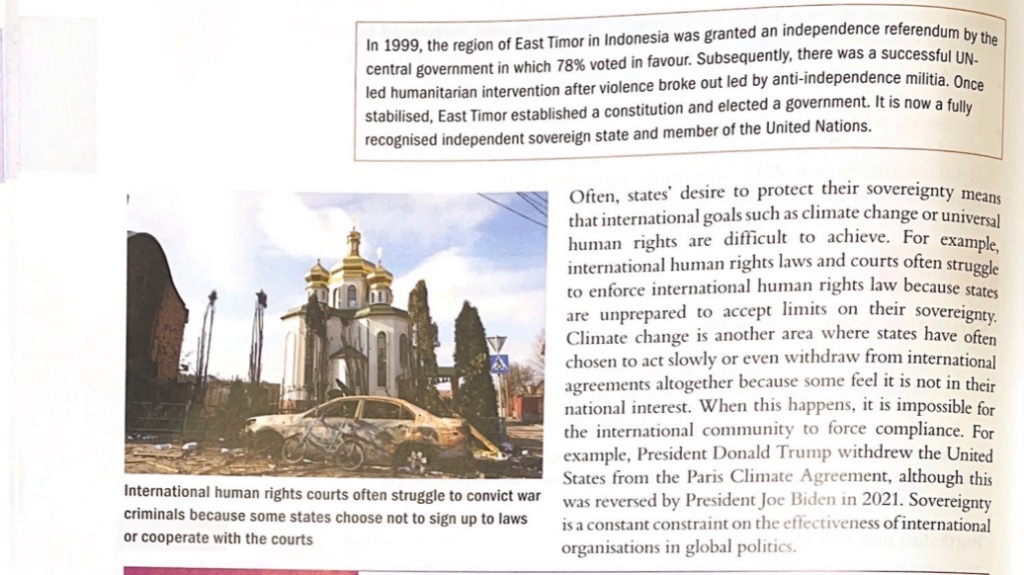
East Timor Independence
- Context of Independence (1999) : East Timor gained independence from Indonesia, with 78% of voters supporting the referendum.
- Thoughts: This event highlights the importance of self-determination in international law and showcases how public votes can lead to significant political changes.
- Additional Information: The transition involved humanitarian intervention led by the UN, reflecting the role of international bodies in conflict resolution and state-building.
Sovereignty and International Goals
- Struggles with Sovereignty: States often prioritize sovereignty over international agreements on climate change and human rights.
- Thoughts: This poses a challenge for global governance as countries may refuse to comply with international norms that they perceive as infringing on their autonomy.
- Additional Information: Climate change requires collective action, yet national interests often impede progress, leading to conflicts between local and global priorities.
Enforcement of Human Rights
- Challenges in Convicting Criminals: International human rights courts have difficulty convicting individuals due to non-cooperation from states.
- Thoughts: The effectiveness of international laws hinges on state participation, which can be inconsistent.
- Additional Information: The reluctance of states to adhere to human rights laws can lead to impunity for violators, undermining global accountability mechanisms.
U.S. Withdrawal from International Agreements
- Paris Climate Agreement: President Donald Trump’s withdrawal highlighted tension between national interests and international commitments; reinstated by President Biden in 2021.
- Thoughts: This back-and-forth demonstrates how domestic policies can drastically affect international cooperation and global environmental efforts.
- Additional Information: The significance of leadership changes in shaping a nation’s foreign policy can influence international relations and agreements on pressing global issues.
Conclusion
- Overall Implications: The dynamics between state sovereignty, international law, and cooperation are complex and require continuous dialogue and negotiation to align national interests with global responsibilities.
Extended readings:
Is State Sovereignty an Outdated Concept in Global Politics?
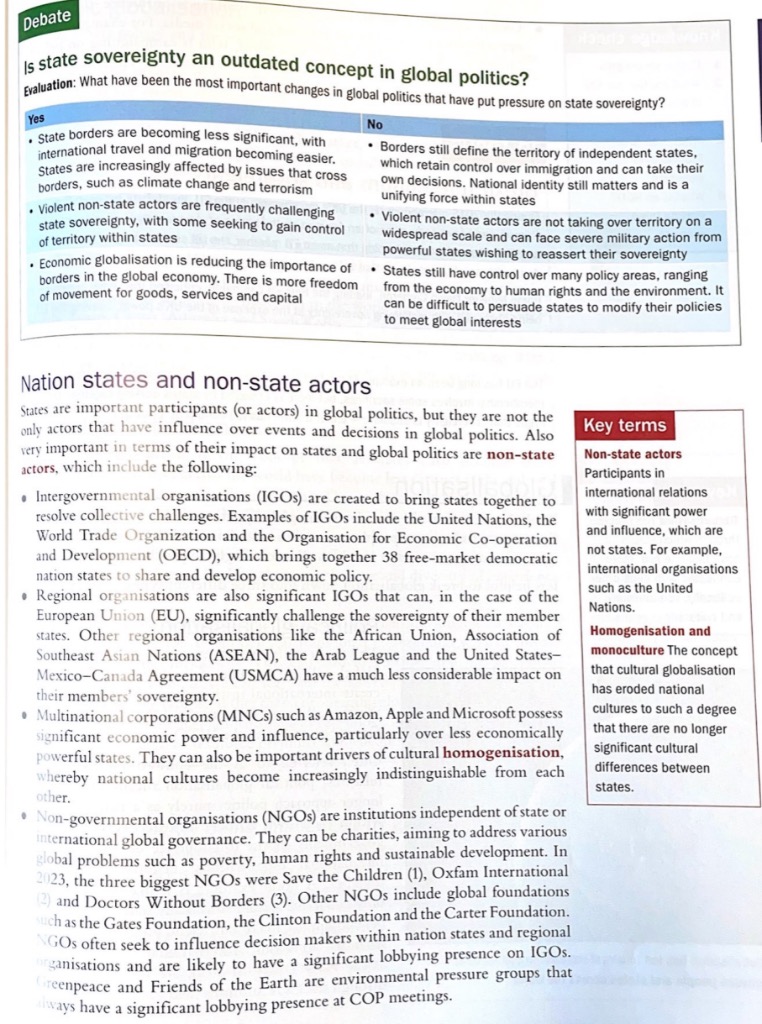
Key Argument Points
For (Yes)
-
State borders are becoming less significant
- With the rise of international travel and migration, state borders are less effective in controlling movement. Global issues such as climate change and terrorism cross these borders, making it harder for states to manage their territories effectively.
-
Violent non-state actors challenging sovereignty
- Non-state actors, such as terrorist organizations, often undermine state control and challenge territorial integrity. Their emergence indicates a shift in power dynamics away from traditional state authority.
-
Economic globalization reducing border importance
- Global economic integration enables freer movement of goods, services, and capital. This undermines traditional notions of state borders as barriers, suggesting a need for more cooperative global governance.
Against (No)
-
Borders still define independent states
- Despite globalization, states maintain control over their territorial integrity and immigration policies. National identity persists, emphasizing the importance of state sovereignty in governance.
-
Non-state actors not widely challenging territorial control
- While some non-state actors are influential, most do not possess the capacity to challenge state sovereignty on a large scale. States can utilize military action to protect their sovereignty from such threats.
-
States retain regulatory control
- States still govern many crucial policy areas, including human rights and environmental regulation. They can impose regulations that align with both domestic and global interests, retaining their sovereign authority.
Nation States and Non-State Actors
Importance of States
- States play a central role in global politics, but there are non-state actors that significantly influence events and decisions.
Types of Non-State Actors
-
Intergovernmental Organizations (IGOs)
- Examples: United Nations, World Trade Organization, OECD.
- IGOs facilitate collaboration among nations to resolve global issues.
-
Regional Organizations
- Examples: European Union, ASEAN, Arab League, USMCA.
- These organizations challenge traditional notions of sovereignty and have varying impacts on member states.
-
Multinational Corporations (MNCs)
- Companies like Amazon and Microsoft wield substantial economic power, influencing policy decisions in sovereign states.
-
Non-Governmental Organizations (NGOs)
- NGOs like Save the Children and Doctors Without Borders focus on global issues such as poverty and human rights, impacting state policies and decisions. They typically advocate for vulnerable populations and drive action on global issues.
Key Terms
- Non-state actors: Entities that act independently of state control.
- Homogenisation and monoculture: Cultural globalization leading to diminishing cultural differences among nations.
Extended readings: